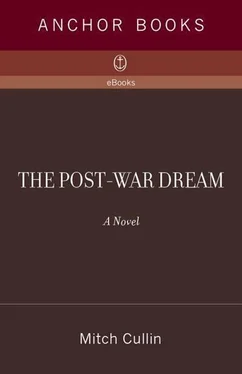How strange, Hollis thought, for death to leave the beast standing. But he also understood that death — that trespasser of safe places — was often curious in method: whether it came beneath a bridge, or by a river, or on a golf course, or in a hospital, or beside a tree. Death, he thought, was like the downfalling of snow last night, so quiet and so pacifying, inevitably blanketing all which might hope to remain untouched. So the pain of dying was one thing, he told himself, whereas death itself was something entirely different, something which was benign by nature and not unkind.
“No,” Lon uttered, “no, no, don't understand it, don't get it — how'd we find ourselves here?” His hand flexed and squeezed against Hollis's hand.
“I don't know,” were the words which floated within steam from Hollis, his body shivering. “I don't know,” he repeated, glad for the small bit of warmth Lon's bare hand afforded him. At that moment the crow screamed a warning at close range, making the pair start and glance up to where it sat nearby. Neither had noticed the large bird's arrival, how it had glided noiselessly right above them as a shadow — wings fully expanded, rigid talons slicing the air — to land atop the fence, turning itself around toward them, and perching there now like a sentry, watching with coal-black sockets and darting, questioning movements of its feathered head.
“We need to go,” Lon said, sounding agitated. “I'm suddenly not feeling all that great. Something isn't right.”
“Okay,” Hollis said, meeting the crow's stare, peering into a blackened socket but perceiving a hollowness where an eye should reflect.
“I think I overexerted myself, I think that's it. And I think Jane is probably worrying, so we really better go.”
Cocking its head, the crow thrust its beak forward, bellowing furiously as if ordering them to leave.
“Okay,” Hollis repeated, hesitating long enough to cast his gaze one last time at the poor creature beneath the orange tree: while Lon — refusing to look anymore, pounding the snow with his galoshes — about-faced and tugged on his hand.
“I'm going.”
Hastily they returned upon their own beaten trail, and as Lon led the way among the field of white which was quickly melting under the sun, Hollis soon discerned the figure of someone else in the distance, an inert shape pausing where Lon had fallen earlier on the ninth hole green. The trodden, slushy trail wound back from the desert and brought them closer to the residential lots of the community, the snow ebbing to a grayish muddy surface as sidewalks and asphalt thawed. But the ultraviolet rays thrown off the ice had become excruciating, and with photophobia now hampering their progress instead of the snow, he couldn't quite yet make out who it was they were fast approaching. Perhaps, he thought, it was another person entranced by the aftermath of the snowfall, or possibly an officer from the sheriff ‘s department who had been alerted by the blinking hazard lights of the parked Suburban, or maybe even one of the many groundskeepers investigating the post-storm condition of the golf course; and if the person hadn't been so tall, he would have assumed it was Lon's wife searching for her husband when he had failed to come home.
Since Lon was leading and held a better vantage point, Hollis asked, “Who is it? Can you tell?”
“How's that?” Lon huffed, short of breath, still pulling Hollis by the hand.
“Do you see who it is?”
The figure was a few yards in front of them, marking the spot where their journey had started and, presently, would conclude.
“Who are you talking about?” Lon answered, his labored voice imparting an entire day's worth of exhaustion. “I don't understand who who is.”
Just then Hollis realized what must be loitering on the ninth hole green. “Never mind,” he said, finally recognizing that familiar likeness he had encountered throughout the years — stock-still with arms hanging at its side, expressionless yet vigilant — that time-ravaged twin who wasn't ever meant for this life: a long, unkempt gray beard flowing from its haggard, wrinkled, and stooped body, dressed as always in jeans which had grown ragged and frayed, worn-down leisure shoes, a moth-eaten T-shirt, and a soiled, once bright blue Windbreaker. “I guess I was seeing things, it's nothing.” For a second Hollis wondered if he should not simply head in a different direction, but upon reaching the ninth hole green he let go of Lon's hand and continued forward. Unaware of Max's lingering proximity, Lon accelerated his pace and brushed past the spectral figure, tiredly waving a hand in the air as he proceeded downhill, almost slipping again while hurrying for the sidewalk.
With long, limping strides Hollis walked directly toward his weathered counterpart, fixing on those vacuous eyes which were, somehow, his own eyes. You'll go, he thought. You'll disappear. However, Max didn't fade from sight or vanish in a blink, and Hollis was now closer to it than he had imagined possible; one stayed put while the other charged headlong without hesitation, both on the verge of collision and unwilling to relent. You'll go, you'll disappear: Hollis winced when passing right through himself, but just beforehand he saw the movement of Max's blistered lips, emitting a parched whisper which entered his own lips and exited at the base of his skull. And then it had communicated to him; it had, in their brief merging, addressed him for the first and only time, simply uttering, “Bye.”
Hollis immediately stopped, peering back over his shoulder. Max wasn't there. For a moment he thought he glimpsed a wavering of light where it had stood — then all he could see was snow and land and the crisscrossed trail. Impossible, it can't be, he said to himself and shuddered. No, he was not mistaken, it had spoken. He had heard its parting message and, too, he had felt the word reverberate inside his head. Turning around, he searched for Lon but saw instead the remaining few yards of golf course, the sidewalk beyond, his Suburban parked in the golf lane — and nothing or no one else. The city seemed abandoned, the streets were deserted, and it would have been natural for him to enjoy the solitude, but now he suddenly harbored an immense sadness for himself and everything which lived or had yet to grow beneath the sun; and with that a feeling of complete isolation came upon him, a deep-reaching sensation of also having been abandoned which constricted a knot of desperation in his gut. Here is the sum total of my existence, he thought and resumed limping. This is it for me.
Then somewhere high above the grid patterns of Nine Springs the wind raced like the currents of a river; and the invisible sheets of ether fused within the sky were in perpetual tumult, bending westward then southward while clouds swelled and moved accordingly. The great breaths of the planet blew farther still along the hemisphere and the wind shifted and shifted. Effortlessly buoyed by the rushing waves of air, itself a dark shape gliding horizontally among the flux, a crow circled what lay far below — that insubstantial island with square plots and tiled rooftops and one inhabitant climbing into a sport-utility vehicle — before changing its direction and flying out across a limitless ocean of open desert.
After Hollis eased the Suburban into his driveway, turning the vehicle off, he sat there for a while with the radio on, listening to the local news and then the statewide weather report. A freak winter storm had shut down various stretches of Interstate 10, the generic-sounding broadcaster stated, but tomorrow things would warm up, the skies would be clear from Tucson to Flagstaff. Upon hearing that, he pulled the keys out of the ignition — and if anybody inside the neighboring homes had been looking through windows, they might have spied his bulky form exiting the Suburban, half limping in muddy leather boots and made even bigger by the padded jacket, perhaps wondering where it was he had traveled to on such an unreceptive morning. Yet no one would catch a glimpse of the dread he was harboring within him-self — as he shuffled, carefully, over icy patches on the concrete and moved toward the house.
Читать дальше










![Theresa Cheung - The Dream Dictionary from A to Z [Revised edition] - The Ultimate A–Z to Interpret the Secrets of Your Dreams](/books/692092/theresa-cheung-the-dream-dictionary-from-a-to-z-r-thumb.webp)

